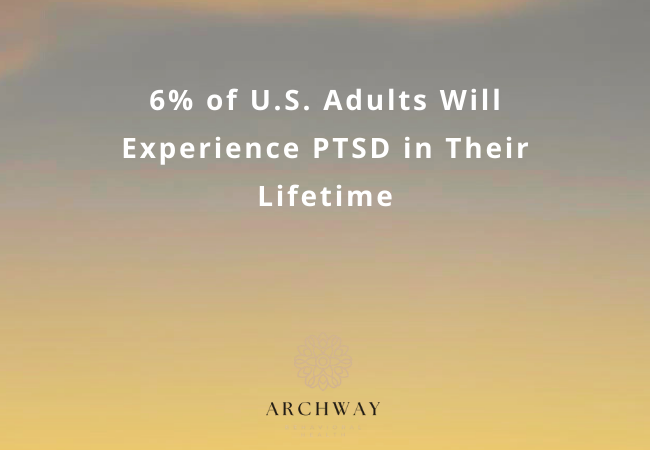Trauma is more than a memory—it’s a physiological and emotional response that can linger long after a distressing event has passed. Whether trauma results from a single incident or prolonged exposure to adverse experiences, the effects can be devastating. From flashbacks and hypervigilance to emotional numbness and self-destructive behaviors, the symptoms of Post-Traumatic Stress Disorder (PTSD) can make everyday life feel unsafe and unpredictable.
Fortunately, there are effective treatments available, and one of the most powerful options for long-term recovery is Dialectical Behavior Therapy (DBT). At Archway Behavioral Health, we use Dialectical Behavior Therapy in Florida as part of our evidence-based, trauma-informed care model across all levels of treatment—including Individual Therapy in Florida, Group Therapy in Florida, our Partial Hospitalization Program Florida (PHP), and Intensive Outpatient Program in Florida (IOP).
This article offers a comprehensive look at how DBT works for treating trauma and PTSD, and why it may be the right path forward for those seeking healing and emotional resilience.
Understanding Trauma and PTSD: More Than Just a Diagnosis
Trauma occurs when an individual experiences overwhelming stress that exceeds their ability to cope. This can be caused by:
- Physical or sexual abuse
- Emotional neglect
- Domestic violence
- Car accidents
- Combat or first-responder experiences
- Bullying
- Natural disasters
- Witnessing or surviving life-threatening events
PTSD is a clinical diagnosis that may follow trauma exposure, characterized by:
- Intrusive memories or flashbacks
- Avoidance of reminders or thoughts
- Hyperarousal or exaggerated startle responses
- Mood swings, irritability, or emotional numbness
- Feelings of hopelessness, shame, or guilt
- Difficulty trusting others
- Suicidal thoughts or self-injury
Many individuals with PTSD also struggle with co-occurring conditions such as anxiety, depression, substance use disorders, or bipolar disorder—making treatment more complex and layered.
Why DBT Is a Game-Changer for Trauma Treatment
Dialectical Behavior Therapy was originally developed to help individuals with chronic emotion regulation issues and self-harming behaviors. Over time, it has become a highly effective approach for treating individuals with complex trauma and PTSD due to its emphasis on safety, stability, and skill-building before diving into trauma processing.
Key reasons DBT is uniquely effective for trauma and PTSD:
- Focuses on building emotional stability first
Before addressing the trauma head-on, DBT teaches clients how to regulate emotions, tolerate distress, and stay grounded. - Addresses high-risk behaviors
Many trauma survivors engage in impulsive or self-harming behaviors to cope with emotional pain. DBT directly targets these patterns. - Improves interpersonal relationships
Trauma often damages trust and connection. DBT teaches how to set boundaries, assert needs, and build healthier relationships. - Reduces reactivity to triggers
With mindfulness and grounding strategies, DBT helps individuals manage flashbacks, panic, and emotional flooding.
At Archway Behavioral Health, we incorporate DBT into all levels of Mental Health Treatments in Florida, helping trauma survivors feel safe, supported, and equipped for long-term recovery.
How DBT Addresses Trauma: The 4 Core Skills
Each DBT skill module offers tools that directly support the trauma healing process.
1. Mindfulness: Reconnecting with the Present
For those with PTSD, the past often feels like it’s happening all over again. Flashbacks, intrusive thoughts, and emotional reactivity can make it difficult to distinguish between past and present. Mindfulness grounds the individual in the here and now.
How it helps:
- Reduces dissociation and emotional detachment
- Enhances body awareness and emotional control
- Teaches observation of emotions and thoughts without judgment
- Supports trauma survivors in responding—not reacting—to distress
At Archway, clients learn mindfulness in Individual Therapy in Florida and practice these skills in Group Therapy in Florida to foster inner calm and awareness.
2. Distress Tolerance: Getting Through the Storm
Trauma often leaves individuals with a low tolerance for distress. Even minor stressors can feel unbearable, leading to emotional shutdowns or impulsive decisions. DBT teaches practical techniques to survive emotional crises without self-harm, substance use, or isolation.
Skills include:
- Distraction techniques (e.g., focusing on the five senses)
- Self-soothing (using sensory tools for comfort)
- TIPP skills (Temperature, Intense exercise, Paced breathing, and Progressive muscle relaxation)
- Radical acceptance (acknowledging reality without resistance)
Real-life impact:
- Prevents relapse or destructive behaviors
- Helps manage panic, emotional flooding, or suicidal thoughts
- Builds confidence in managing distress independently
These strategies are especially vital for clients in our Partial Hospitalization Program Florida, where emotional crises are often more frequent or severe.
3. Emotion Regulation: Mastering the Emotional Rollercoaster
Trauma survivors often feel like their emotions are overwhelming or uncontrollable. They may swing between numbness and emotional chaos. DBT helps individuals identify, understand, and modulate emotional responses.
Skills taught include:
- Naming and validating emotions
- Reducing vulnerability to negative emotions (e.g., through sleep, diet, and exercise)
- Building positive emotional experiences
- Using “opposite action” to shift mood states
Benefits:
- Greater control over emotional intensity
- Reduced mood instability and reactivity
- Improved ability to express emotions constructively
Clients in our Intensive Outpatient Program in Florida often report major improvements in their ability to handle stress and avoid emotional outbursts after learning these techniques.
4. Interpersonal Effectiveness: Rebuilding Trust and Connection
Trauma can severely damage relationships. Survivors may withdraw from loved ones, struggle with trust, or become overly dependent or avoidant. This module teaches skills to rebuild healthy, respectful, and balanced relationships.
Key techniques:
- Assertive communication (DEAR MAN)
- Boundary setting (FAST)
- Validation and empathy (GIVE)
How it helps:
- Promotes safe, respectful communication
- Reduces isolation and codependency
- Builds confidence in expressing needs without guilt
In Group Therapy in Florida, clients practice these skills in real-time, gaining peer feedback and guidance from experienced therapists.
What Trauma-Tailored DBT Looks Like at Archway Behavioral Health
At Archway, our trauma-informed DBT programming is delivered through a full continuum of care:
Individual Therapy in Florida
Private sessions where clients explore their trauma history, develop personal coping plans, and apply DBT skills to their real-world challenges.
Group Therapy in Florida
Structured, therapist-led DBT groups focused on skill-building, shared experiences, and peer accountability.
Partial Hospitalization Program Florida (PHP)
Full-day support including multiple therapy sessions, skills groups, and psychiatric care. Ideal for individuals in crisis or needing intensive stabilization.
Intensive Outpatient Program in Florida (IOP)
Flexible, step-down care for those ready to apply DBT skills in daily life. Sessions are held multiple times per week to reinforce structure and accountability.
All levels of care are rooted in compassionate, trauma-informed practices and tailored to each client’s recovery journey.

Co-Occurring Disorders and Comprehensive Care
PTSD rarely exists in a vacuum. Many trauma survivors also suffer from:
- Anxiety disorders
- Depression
- Bipolar disorder
- Substance use or dual diagnoses
- Eating disorders
- Self-harm or suicidal ideation
Our integrated DBT approach is designed to address all of these concerns simultaneously. We provide access to:
- Anxiety Treatment in Florida
- Bipolar Treatment in Florida
- Medication management and psychiatric support
- Holistic therapies (e.g., yoga, art, movement)
- Trauma education and relapse prevention planning
Why Choose Archway Behavioral Health for DBT and Trauma Recovery?
When it comes to healing from trauma or PTSD, the environment, team, and treatment approach you choose matter deeply. At Archway Behavioral Health, we are more than just a Mental Health Treatment Center in Florida—we are a trusted healing space where compassion meets clinical excellence.
Here’s why individuals across Florida turn to us for trauma-focused DBT care:
1. Specialized Expertise in DBT and Trauma Treatment
Our clinicians are highly trained in Dialectical Behavior Therapy in Florida and deeply experienced in treating trauma, PTSD, and co-occurring conditions like anxiety and bipolar disorder. We don’t just teach DBT skills—we help you integrate them into your life for long-term change.
2. Comprehensive Continuum of Care
Whether you need weekly Individual Therapy in Florida, structured support through Group Therapy in Florida, or more intensive programming like our Partial Hospitalization Program Florida or Intensive Outpatient Program in Florida, we tailor treatment to meet your specific clinical needs and personal goals.
3. Trauma-Informed, Client-Centered Philosophy
We know that trauma recovery requires safety, trust, and choice. That’s why every aspect of our care—from the first phone call to the final session—is grounded in empathy, empowerment, and evidence-based practice. You are always in control of your journey here.
4. Integrated Mental Health Services
Many trauma survivors also struggle with other mental health concerns. At Archway, we offer fully integrated Mental Health Treatments in Florida, including Anxiety Treatment, Bipolar Treatment, and Cognitive Behavioral Therapy in Florida, ensuring your care addresses the whole you—not just one diagnosis.
5. A Welcoming, Safe Space for Healing
From the moment you walk through our doors, you’ll feel the difference. Our clinical team, support staff, and peers create a warm, nonjudgmental environment where you can let your guard down and focus on what matters most—healing.
Conclusion
Healing from trauma isn’t about forgetting what happened—it’s about learning to live fully in the present, without being held hostage by the past. Through the structure and skill-building of Dialectical Behavior Therapy, you can learn to manage intense emotions, respond to triggers with confidence, and rebuild your sense of safety, purpose, and connection.
At Archway Behavioral Health, we specialize in helping individuals heal from trauma with compassion, expertise, and evidence-based care. Whether you’re struggling with PTSD, emotional dysregulation, or co-occurring challenges like anxiety or bipolar disorder, you don’t have to navigate this journey alone. Contact Archway Behavioral Health at 888.488.4103 today. We offer a place to pause, breathe, and rebuild—one step, one skill, one day at a time.
FAQ About DBT for Trauma and PTSD
Can DBT be used to treat trauma and PTSD?
Yes. While DBT was originally developed for Borderline Personality Disorder, it is now widely used to treat trauma and PTSD. DBT helps clients manage intense emotions, reduce self-harm, build emotional resilience, and improve interpersonal functioning—all essential for trauma recovery.
How is DBT different from other trauma therapies like EMDR or prolonged exposure?
DBT focuses first on stabilization and skill-building, whereas EMDR and prolonged exposure directly process traumatic memories. DBT is especially effective for individuals with complex trauma or emotional dysregulation, and it can be a foundation for later trauma-focused work.
What symptoms of PTSD can DBT help with?
DBT can help reduce symptoms such as emotional flashbacks, hyperarousal, avoidance behaviors, self-harming tendencies, dissociation, panic attacks, and interpersonal difficulties. It’s especially helpful for managing triggers and regaining emotional control.
Do I have to talk about my trauma directly in DBT?
Not at first. DBT focuses on building skills like mindfulness, distress tolerance, and emotion regulation before diving into trauma narratives. This makes it a safer option for people who aren’t yet ready for trauma processing.
Is DBT offered in group and individual therapy formats?
Yes. At Archway Behavioral Health, DBT is delivered through Individual Therapy in Florida, Group Therapy in Florida, and as part of structured programs like our Partial Hospitalization Program Florida (PHP) and Intensive Outpatient Program in Florida (IOP).


